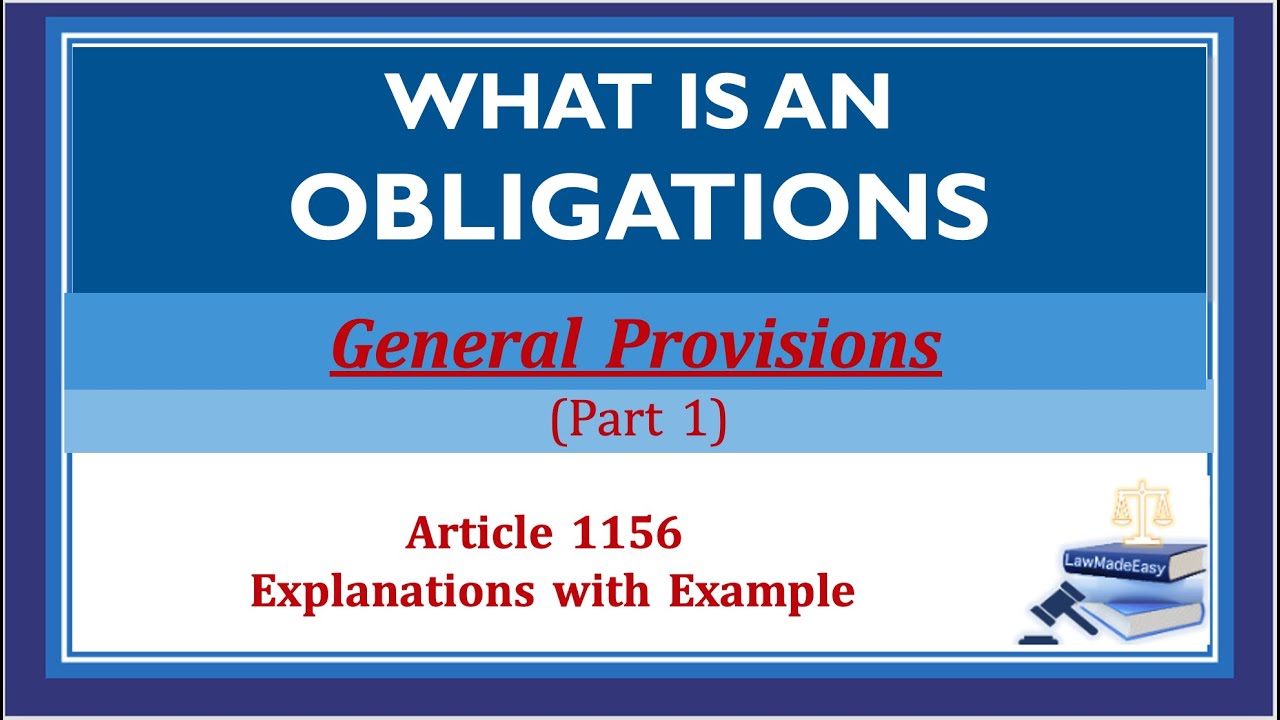Law on Obligations- Chapter 1
Summary
TLDRThis lecture on 'Law on Obligations' delves into the foundational aspects of obligations as defined by the Civil Code of the Philippines. It distinguishes between civil and natural obligations, emphasizing the juridical necessity of the former and the ethical basis of the latter. The lecture outlines essential elements of an obligation, such as the passive and active subjects, the object or prestation, and the legal tie. It also explores the forms and kinds of obligations, including real and personal obligations, and their sources, like law, contracts, quasi-contracts, and torts. The discussion highlights the importance of understanding obligations for legal and business applications.
Takeaways
- 📚 The lecture introduces the concept of 'obligation' in law, as defined by Article 1156 of the Civil Code of the Philippines, which includes the necessity to give, do, or not to do something.
- 👨⚖️ 'Juridical necessity' implies that if an obligation is not fulfilled, legal action may be taken, distinguishing it from moral or social expectations.
- 🤝 Civil obligations allow for enforcement through the courts, while natural obligations are based on principles of equity and natural law without enforceability.
- 💼 The lecture differentiates between 'active subjects' (creditors or obligees) and 'passive subjects' (debtors or obligors) in the context of obligations.
- 🔑 Essential elements of an obligation include the passive subject, active subject, object or prestation, and the legal tie that binds the parties.
- 📈 The lecture explains reciprocal obligations where each party is both a debtor and a creditor, exemplified by a contract of sale.
- 📑 Forms of obligations can be oral or written, and they may arise from various sources such as law, contracts, quasi-contracts, crimes, and quasi-delicts.
- 🏛️ The source 'law' refers to obligations mandated by statutes, like paying taxes or caring for one's children.
- 🤝 'Contracts' are agreements between two or more parties that create obligations, provided they are lawful and consensual.
- 🔄 'Quasi-contracts' are not based on consent but are recognized by law to prevent unjust enrichment, such as when someone manages another's affairs without their knowledge.
- 🚫 'Crimes' and 'quasi-delicts' are actions that are punishable by law and can result in obligations to compensate for damages or return stolen property.
Q & A
What is the definition of an obligation according to Article 1156 of the Civil Code of the Philippines?
-An obligation is defined as a juridical necessity to give, to do, or not to do.
What is the difference between a civil obligation and a natural obligation?
-A civil obligation gives the creditor or obligee the right to enforce performance, while a natural obligation is based on equity and natural law and does not provide a right of action.
What are the essential requisites of an obligation?
-The essential requisites of an obligation include a passive subject (the obligor), an active subject (the creditor or obligee), and the object or prestation (the subject matter of the obligation).
What is a reciprocal obligation and provide an example?
-A reciprocal obligation is where the parties are reciprocally debtors and creditors of each other. An example is a contract of sale where one party is obligated to deliver the item being sold, and the other is obligated to pay for it.
What are the forms of obligations?
-The forms of obligations can be oral or in writing, and they are the manner in which the obligation is manifested.
What is a real obligation and provide an example?
-A real obligation is an obligation to give, such as delivering a fruit basket or 10 sacks of rice.
What is a personal obligation and how does it differ from a real obligation?
-A personal obligation is an obligation to do or not to do, which contrasts with a real obligation that involves giving something. Examples of personal obligations include positive obligations like rendering services, and negative obligations like not selling property within a certain period.
What are the sources of obligations according to the mnemonic LC QAQ?
-The sources of obligations are Law, Contracts, Quasi-contracts, Acts or omissions punishable by law, and Quasi-delicts.
Can a single person enter into a contract by himself?
-No, a contract requires at least two parties. A single person cannot enter into a contract with himself alone.
What is the difference between a quasi-contract and a regular contract?
-A quasi-contract, unlike a regular contract, does not require consent. It results from unilateral acts which are lawful and voluntary and is meant to prevent unjust enrichment.
What are the kinds of quasi-delicts and provide an example for each?
-The kinds of quasi-delicts include negligence resulting in physical injuries, which may be slight or serious. An example is the obligation to pay for medical expenses if you negligently cause harm to someone.
Outlines

このセクションは有料ユーザー限定です。 アクセスするには、アップグレードをお願いします。
今すぐアップグレードMindmap

このセクションは有料ユーザー限定です。 アクセスするには、アップグレードをお願いします。
今すぐアップグレードKeywords

このセクションは有料ユーザー限定です。 アクセスするには、アップグレードをお願いします。
今すぐアップグレードHighlights

このセクションは有料ユーザー限定です。 アクセスするには、アップグレードをお願いします。
今すぐアップグレードTranscripts

このセクションは有料ユーザー限定です。 アクセスするには、アップグレードをお願いします。
今すぐアップグレード関連動画をさらに表示

UPDATED DISCUSSION: What is an Obligation? Obligations and Contracts General Provision. Part 1.

General Provisions - Obligations (Part 1)

1 Pengantar Hukum Perdata

Hukum Perdata #19 | Pengertian dan Sumber Hukum Perikatan

Introdução ao Direito das Obrigações (1.1)

Dwi Aryanti Ramadhani, S.H., M.H. - HUKUM PERIKATAN (JENIS-JENIS PERIKATAN)
5.0 / 5 (0 votes)
